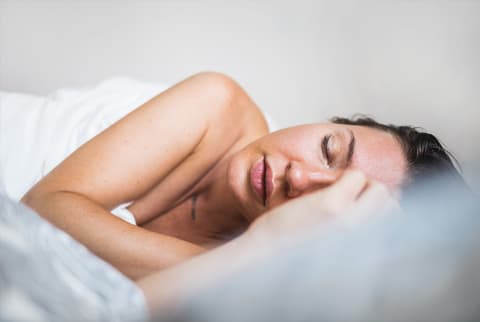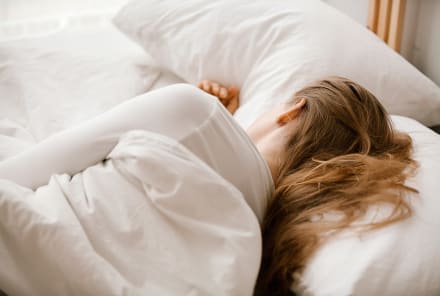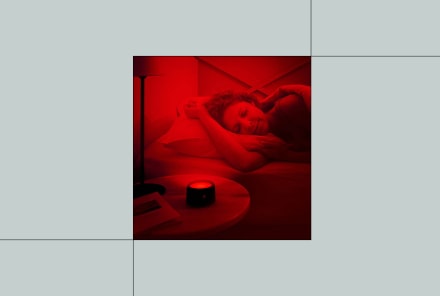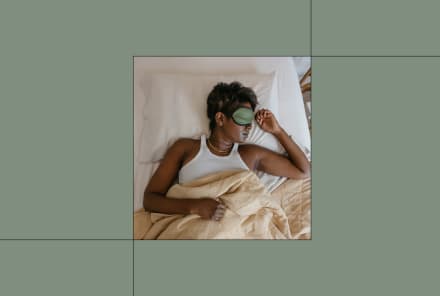Advertisement
We Asked, Sleep Docs Answered: Is Pressing Snooze Really That Bad?


When the snooze button was first invented in the 1950s, legend goes that it lasted nine minutes because anything beyond that would have been too difficult to program into a mechanical clock. Fast-forward to today and those very arbitrary nine minutes are a saving grace to sleepers everywhere—factored into morning routines like, well, clockwork.
According to very unofficial polling of the mindbodygreen editorial team, 67% of us press the snooze button on a typical morning. Of those who do, 33% of us press it more than three times (raising my hand sheepishly).
Curious about whether the snooze button is just an innocent creature comfort or something more sinister, I reached out to sleep doctors for their take. Does snoozing actually give us a few more minutes of precious sleep, or does it take a toll on our energy and alertness? Here are their thoughts on whether or not snoozing is, in fact, losing.
Meet the experts:
- Angela Holliday-Bell, M.D.: Physician and The Solution Is Sleep founder
- Meredith Broderick, M.D.: Sleep neurologist and Ozlo Sleep medical advisory board member
- Michael J. Breus, Ph.D.: Sleep psychologist and Sleep Doctor founder
- Shelby Harris, PsyD, DBSM: Sleep psychologist and author of The Women's Guide to Overcoming Insomnia
- Nishi Bhopal, M.D.: Board-certified integrative psychiatrist and sleep doctor
Snoozing may help you ease into the day
"Sleep isn't a switch. Some of us need to ease ourselves into wakefulness," says Meredith Broderick, M.D. She equates snoozing to using a wind-down routine to get ready for sleep—just in reverse.
"Snoozing can allow for a gradual transition from sleep to wakefulness rather than an abrupt wake-up," echoes Nishi Bhopal, M.D.
"For some people, snoozing helps them get a bit more sleep overall and leads to a bit more gradual of wake-up," says Shelby Harris, PsyD, DBSM—though she caveats that this won't be the case for everyone.
But it doesn't actually give you more time in deep sleep
The nine minutes that the snooze button allows for isn't enough time to fall back into the deep sleep stage, where most cellular repair occurs. In other words, the sleep you get while snoozing isn't as restorative as the sleep you get during the rest of the night.
By the logic, if you intentionally set your first alarm before you need to get up with the intention of snoozing, you'd likely get more high-quality sleep overall if you just set it for later. This is why Michael J. Breus, Ph.D., actually considers the snooze button the "worst invention ever for sleep."
"Many believe hitting the snooze button makes it easier for them to wake up and get the feeling of getting more sleep. However, many don't realize that they are actually robbing themselves of more deep sleep in the morning, which can lead to them feeling less rested overall," says Angela Holliday-Bell, M.D.
Sleep specialists agree that the best way to deepen your sleep is to go to bed and wake up at roughly the same time every day. That way, your body will naturally get into a rhythm of sleeping during these hours. If you press the snooze button for different amounts of time each day, it could throw off this sleep schedule and diminish overall sleep quality—though this hasn't been studied directly.
Experts are torn on whether the snooze button increases morning grogginess
Breus argues that since it encourages more time in light vs. deep sleep phases, the snooze button increases the likelihood of waking up with brain fog and a sour mood.
Holliday-Bell agrees: "Snoozing is not a good idea because it causes fragmented sleep, leading to poor sleep quality, and making you feel less rested. It also makes you more likely to experience that groggy, disoriented feeling upon awakening called sleep inertia."
However, Broderick points to recent research showing it may not be all that bad. The study, published last month in the Journal of Sleep Research, looked at how pressing the snooze button affected 31 adults' functioning in the morning. After sleeping in a lab setting, participants either snoozed for 30 minutes or woke right up at the first alarm before completing a series of cognitive tests. People actually performed slightly better on the tests after pressing snooze, and snoozing did not seem to impact their overall sleep quality or sleepiness, mood, or cortisol levels come wake-up.
"A brief snooze period may thus help alleviate sleep inertia, without substantially disturbing sleep, for late chronotypes and those with morning drowsiness," the researchers conclude.
However, there hasn't been much large-scale research on this topic, so it's hard to draw firm conclusions. The snooze button might also impact people differently, with night owls finding it more helpful than early birds.
If there's one thing the experts polled do agree on, it's that relying too heavily on the snooze button or having trouble getting out of bed no matter how much sleep you get could be a sign of an underlying sleep disorder.
How they recommend using (or not using) it:
- "I say limit snooze to 15 minutes. Bottom line, if you find you are snoozing for hours, it could be a sign of sleep deprivation or a sleep disorder." —Broderick
- "Rather than use the snooze, I suggest that people set the clock across the room, and set it for the last possible time they could have to sleep until. And if they still can't stop, enlist their bed partner. They really don't like their partner's snooze button!" —Breus
- "Instead of hitting snooze, you should try a gentle alarm clock such as a sunrise alarm that awakens you naturally leading to less sleep inertia and an easier time getting out of bed." —Holliday-Bell
- "In general, I'm not a fan of the snooze button for most people. But if it works for you and you don't feel worse, then go ahead! If you struggle with getting up and routinely rely on the snooze button, I wonder if you're struggling with not getting enough sleep or have poor sleep quality." —Harris
- "The ideal thing to do is establish a consistent wake-up time and go to bed at a time that allows you to get the amount of sleep you need to feel rested. That way, you won't have to dread the morning alarm and keep hitting snooze." —Bhopal
The takeaway
While the snooze button may make it easier for some of us to wake up in the morning, it doesn't increase the amount of time we spend in deep, restorative sleep. The jury's still out on whether snoozing impacts morning wakefulness; it might depend on the person and their sleep habits. If you're a snoozer looking to break the habit, here are some tips for how to get those nine (or 18, or 27) minutes back.
Watch Next
Enjoy some of our favorite clips from classes
Enjoy some of our favorite clips from classes
What Is Meditation?
Mindfulness/Spirituality | Light Watkins
Box Breathing
Mindfulness/Spirituality | Gwen Dittmar
What Breathwork Can Address
Mindfulness/Spirituality | Gwen Dittmar
The 8 Limbs of Yoga - What is Asana?
Yoga | Caley Alyssa
Two Standing Postures to Open Up Tight Hips
Yoga | Caley Alyssa
How Plants Can Optimize Athletic Performance
Nutrition | Rich Roll
What to Eat Before a Workout
Nutrition | Rich Roll
How Ayurveda Helps Us Navigate Modern Life
Nutrition | Sahara Rose
Messages About Love & Relationships
Love & Relationships | Esther Perel
Love Languages
Love & Relationships | Esther Perel
What Is Meditation?
Box Breathing
What Breathwork Can Address
The 8 Limbs of Yoga - What is Asana?
Two Standing Postures to Open Up Tight Hips
How Plants Can Optimize Athletic Performance
What to Eat Before a Workout
How Ayurveda Helps Us Navigate Modern Life
Messages About Love & Relationships
Love Languages
Advertisement

This Little-Known Supplement Helps Women Sleep & Decreases Signs Of Depression
Molly Knudsen, M.S., RDN

Want To Be Metabolically Healthy? New Study Shows An Underutilized Approach
Molly Knudsen, M.S., RDN

This Little-Known Supplement Helps Women Sleep & Decreases Signs Of Depression
Molly Knudsen, M.S., RDN

Want To Be Metabolically Healthy? New Study Shows An Underutilized Approach
Molly Knudsen, M.S., RDN













